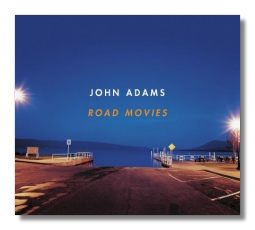
The Internet's Premier Classical Music Source
Related Links
- Adams Reviews
- Latest Reviews
- More Reviews
-
By Composer
-
Collections
DVD & Blu-ray
Books
Concert Reviews
Articles/Interviews
Software
Audio
Search Amazon
Recommended Links
Site News
 CD Review
CD Review
John Adams

Road Movies
- Road Movies (1995) **
- Hallelujah Junction (1996) *^
- China Gates (1977) *
- American Berserk (2001) *
- Phrygian Gates (1977) ^
** Leila Josefowicz, violin
** John Novacek, piano
* Nicolas Hodges, piano
^ Rolf Hind, piano
Nonesuch 79699-2 67:26
John Adams's long-standing relationship with Nonesuch Records continues with this CD, which includes two first recordings: Hallelujah Junction, composed in 1996, and American Berserk, composed in 2001. The first is a work for two pianos, named after a truck stop on the border between California and Nevada. After years of wondering what kind of music might have the title "Hallelujah Junction," Adams decided to answer his own question. Indeed, the work that resulted is a good example of "driving music," in the most literal sense – it won't jolt you off the road with sudden twists and turns, nor is it slow or repetitive enough to lull you into falling asleep behind the wheel. To a large degree, Adams was inspired by the music inherent in and implied by the word "hallelujah." Fifteen minutes in length, Hallelujah Junction is a nice workout for two pianists, and an interesting and ultimately exciting outing for the listener. Originally written for pianists Grant Gershon and Gloria Cheng, here is it played with pealing precision by Hodges and Hind.
Adams calls American Berserk (a phrase from Philip Roth, but with a sideways glance at Bret Easton Ellis's American Psycho ?) "a fast, fractured study of what could be called 'indigenous' rhythms." (Indigenous to whom or to what, however?) This six-minute piano solo (composed for Garrick Ohlsson, but played here by Hodges) is at times undone by its own spurting and sputtering agitation. Both here and in Hallelujah Junction, Adams writes rhythms whose improbable, irregular complexity recalls some of Conlon Nancarrow's etudes for player piano.
For many of us, Phrygian Gates (1977) was part of our first encounter with Adams's music. (It was the "B side" to the early recording of Shaker Loops.) Flatter and more minimalist than the composer's later work, its hypnotic prettiness remains viable. I find Mark McCray's original recording to be truer to the work's spirit than Hind's. There are times when this new recording seems a little impatient with the material. China Gates, written in the same year, is a much shorter and, emotionally speaking, much less complicated cousin to Phrygian Gates. Hodges plays it well here, but again, other pianists have brought more Zen calm to it.
Road Movies (1995) is the work that gives this CD its title. Don't expect an homage to Bing Crosby and Bob Hope, however. Instead, think about a violin and a piano going on a long car trip on the Great Plains; what might they see and what might they say to each other? The landscape rolls by with superficial uneventfulness until the eye begins to entertain itself by finding distinctive features. In the middle movement, the piano and the violin engage in a slightly bluesy, drowsy dialogue over what they are seeing. Then, in the last movement, the tempo picks up again, and hints of jazz and bluegrass confirm that the landscape is authentically American. Josefowicz and Novacek play this work smilingly, without a trace of motion sickness or pretension.
The booklet notes are by Adams, and the engineering captures the instruments faithfully, and in an attractive environment.
Copyright © 2004, Raymond Tuttle




















